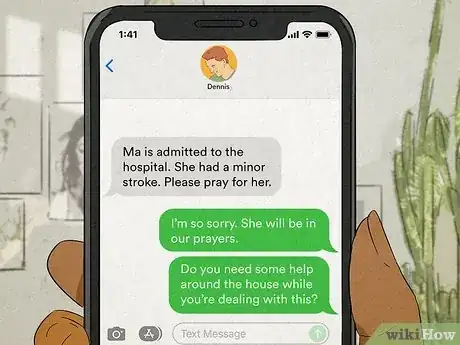This article was co-authored by Josh Spurlock, MA, LPC, CST and by wikiHow staff writer, Nihal Shetty. Josh Spurlock is a Licensed Professional Counselor and the Founder and CEO of MyCounselor.Online. With more than 15 years of experience, he specializes in marriage counseling, family counseling, and sex therapy through a Christian counseling lens. Josh holds a Bachelor’s Degree in Biblical Languages, Literatures, and Linguistics and a Master’s in Counseling Psychology from Evangel University.
There are 8 references cited in this article, which can be found at the bottom of the page.
This article has been viewed 40,924 times.
When a friend asks for prayers, they’re probably going through a tough time. Whether you personally believe in prayer or not, we’re here to show you how you can best be there for someone when they make this request. In this article, we’ll walk you through a variety of helpful responses you can use when someone asks for prayers.
Steps
“You’re in my thoughts.”
-
This is always an appropriate response. This response is especially helpful if you don’t personally pray—all of us, religious or not, can keep the welfare of others in mind. You can also try try something like:[1] X Research source
- “I’m thinking of you.”
- “I’m sending positive thoughts.”
- “You’ll be in my thoughts.”
“I’m wishing you courage and strength.”
-
This is a great way to respond in almost any situation. After all, you don’t have to believe in prayer to believe in the importance of wishing others strength during a difficult time. You can also say:[2] X Research source
- “Sending good vibes.”
- “I believe in you, and know you’ll get through this.”
- “I really hope that everything works out okay.”
“I’m sorry you’re going through this.”
-
Empathy can mean a lot to a friend in trouble. Regardless of whether you pray or not, giving them an expression of genuine empathy can make them feel supported. You can also say things like:[3] X Research source
- “I really feel for you.”
- “I’m so sorry that things have been tough.”
- “I can see that this has been really hard on you.”
“I’m here for you.”
-
A simple expression of support is a good idea. People asking for prayers want comfort and reassurance that others have their back. Let them know that you're available as a source of support by saying:[4] X Research source
- “I’ve got your back.”
- “You can count on me for whatever you need.”
- “I care about you.”
“Of course I will.”
-
If you believe in prayer, accept your friend’s request. It’s an honor to be invited to pray for someone, and fulfilling your friend’s request for prayers can be very meaningful. Tell them that you’ll pray for them, and set aside some time to follow through.[5] X Research source
- You can also say things like “I’ll be glad to” or “You don’t have to ask twice.”
- If you’re juggling multiple prayer requests, log them in a notebook to keep track.
- After you pray for your friend, let them know. You might say, “Just wanted to let you know that I prayed for you. I’ll keep you in my prayers for as long as it takes to get through this."
“Can I let others know to pray for you as well?”
-
Some believe that many prayers are stronger than one. If you’d like to marshall a prayer army on your friend’s behalf, let them know in advance. Some people might prefer to keep their troubles quiet, and it’s important to respect this decision.[6] X Research source If they give you the go-ahead, ask your community something like:
- “A friend of mine is dealing with a death in their family. Can you help me pray for them?”
“Thank you for letting me know.”
-
Reassure your friend they were right to open up to you. Asking someone to pray for you can feel very vulnerable—you’re trusting someone with the knowledge that you’re going through difficulties. Let your friend know that you’re someone they should feel safe around and that they were right to reach out to you for support. Say something like:[7] X Research source
- “Thank you for trusting me enough to share this with me.”
- “I’m grateful to you for confiding in me.”
- “I know it’s hard to talk about these things, but I’m glad you did.”
“Is there anything else you need?”
-
Offers of practical support can help a friend in need. During stressful situations, it can feel nearly impossible to deal with a crisis while taking care of daily tasks. Asking your friend if you can help them out with anything in particular gives them a chance to articulate their needs, which can be a lifesaver when times are tough. You can also say something like:[8] X Research source
- “What else can I do to help you out?”
- “Do you need some help around the house while you’re dealing with this?”
- “Anything I can do to ease the burden?”
“I’ll keep my fingers crossed.”
-
This is a casual response you can use for less serious situations. If your friend is asking you for prayers because, say, they have a stressful job interview or exam coming up, it’s okay to be a bit more light-hearted. They may not be expecting actual prayers—a sign that you wish them success is good enough. You can also say:[9] X Research source
- “I know you’ll do great.”
- “I’m cheering you on from the sidelines.”
“Can you tell me more about what’s going on?”
-
Getting more details can help you find other ways to help. Your friend may be looking for someone to open up to. Give them an opportunity to tell you more about their situation. You might be able to connect them with helpful resources.[10] X Research source
- For example, you might know a doctor who can give their ill family member a second opinion.
“How are you feeling?”
-
Make sure you check on your friend’s emotional state. If your friend has been dealing with a stressful situation, it’s possible that it’s taken a toll on their mental health. Asking a simple question about how they’re feeling can give them some space to vent and express their emotions. You can also ask:[11] X Research source
- “How have you been coping?”
- “Are you doing okay?”
- “What’s your headspace been like recently?”
You Might Also Like
 How to Pray Janazah
How to Pray Janazah



 How, When, and Why to Pray a Novena
How, When, and Why to Pray a Novena




 How to Pray the Seven Sorrows
How to Pray the Seven Sorrows




References
- ↑ https://www.psychologytoday.com/us/blog/the-gift-insight/201908/better-communication-in-times-grief
- ↑ https://www.psychologytoday.com/us/blog/the-gift-insight/201908/better-communication-in-times-grief
- ↑ https://www.psychologytoday.com/us/blog/laugh-cry-live/201810/10-tips-offering-real-comfort-people-in-crisis
- ↑ https://students.ubc.ca/ubclife/emotional-intelligence-101-empathetic-responses
- ↑ https://groupleaders.org/blog-feed/3-ways-to-follow-through-on-prayer-requests
- ↑ https://www.redeemer.com/learn/prayer/prayer_and_fasting/how_to_pray_with_others_tips_for_group_prayer
- ↑ https://students.ubc.ca/ubclife/emotional-intelligence-101-empathetic-responses
- ↑ https://www.heretohelp.bc.ca/infosheet/helping-a-friend-youre-worried-about
- ↑ https://blog.abaenglish.com/seven-ways-to-say-good-luck-in-english/
About This Article
























































